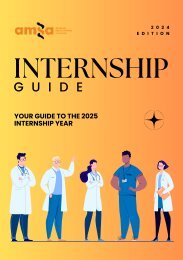The 2022 Starting Med Guide
Time truly flies. It's 2022, and we're welcoming another cohort of first-year students to medical schools across Australia. On behalf of your AMSA, we are so happy to have you! Throughout your degree, AMSA is here to support you at every turn. Whether you have a passion for advocacy or policy, global, rural, Indigenous or queer health, medical education, mental health, gender equity, national and international health politics, leadership, events or community, you will find opportunity for growth and discovery within AMSA. We understand that starting medicine can be daunting, and so our team has put together this guide to help you along the way. Enclosed within are tips and tricks, academic and study, career and networking advice, and available crisis and non-urgent support services.
Time truly flies. It's 2022, and we're welcoming another cohort of first-year students to medical schools across Australia.
On behalf of your AMSA, we are so happy to have you! Throughout your degree, AMSA is here to support you at every turn. Whether you have a passion for advocacy or policy, global, rural, Indigenous or queer health, medical education, mental health, gender equity, national and international health politics, leadership, events or community, you will find opportunity for growth and discovery within AMSA.
We understand that starting medicine can be daunting, and so our team has put together this guide to help you along the way. Enclosed within are tips and tricks, academic and study, career and networking advice, and available crisis and non-urgent support services.
You also want an ePaper? Increase the reach of your titles
YUMPU automatically turns print PDFs into web optimized ePapers that Google loves.
Andrew’s Story<br />
<strong>The</strong> year was 2005, John Howard was the PM, Wedding Crashers was a box office<br />
hit and James Blunt was a household name. Meanwhile, I was in Year 12 preparing<br />
for my HSC and contemplating my future. I had my sights set on studying <strong>Med</strong>icine,<br />
but as it would turn out, my UAI (now ATAR) fell short of the cut-off. Disappointed<br />
and unenthused, I studied Health Science PDHPE for 2 years before joining the<br />
ranks of Fire & Rescue NSW. However, it wasn’t long before my desire to study<br />
<strong>Med</strong>icine was reignited. While I knew it was what I wanted to do, the application<br />
process wasn’t so simple.<br />
I conducted research on admission to various universities, with due consideration<br />
of my circumstances. I was 28, married, and with my wife and I both working fulltime, we had a<br />
number of commitments and responsibilities that made relocating<br />
for the purpose of studying virtually impossible. Fortunately, I was lucky enough<br />
to secure a place in a medical program not too far from home and I was able to<br />
manage the challenging adjustment to study. However, as the course progressed,<br />
I found that my ability to cope changed.<br />
Previously, I would spend my free time doing things I enjoyed; exercising, catching<br />
up with friends and walking my dogs – things that were all taken for granted. Now,<br />
not only was my free time now taken over by study commitments, time that was<br />
previously allocated for housework and personal care; mowing lawns, getting<br />
haircuts, visiting a doctor, would all become things of the past. A real issue is that<br />
coming into <strong>Med</strong>icine with too many commitments (which is often the case for<br />
mature-aged students) can be very taxing. As time progresses, it can quickly affect<br />
your health and wellbeing as well as your performance in the course.<br />
Indeed, class attendance is crucial with 100% being expected year-round, not only<br />
for meeting course requirements but also for the benefit of your learning. As a<br />
mature-aged student, different responsibilities that arise can affect university<br />
attendance, like the birth of our first baby in August last year. Whilst you may not<br />
be expecting children any time soon, remember that <strong>Med</strong>icine is a long journey,<br />
and additional questions such as when to have children and when to get married<br />
are all considerations.<br />
On a positive note, the diverse life experiences that come with being a matureaged student are<br />
invaluable in medical school. Student-patient interactions<br />
are fluid, particularly when dealing with stressful situations or patients who are<br />
very unwell. Patients tend to gravitate towards the mature-aged student, making<br />
requests to conduct a physical exam or to have a chat far easier. Overall, applying<br />
for <strong>Med</strong>icine as a mature-aged student requires careful consideration of vastly<br />
different circumstances compared to that of a high school leaver.<br />
- Andrew, UNSW <strong>Med</strong>icine IV<br />
<br />
14

















